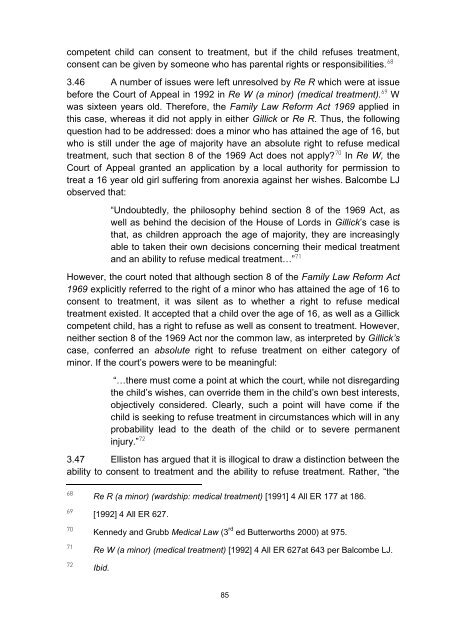Consultation Paper on Bioethics - Law Reform Commission
Consultation Paper on Bioethics - Law Reform Commission
Consultation Paper on Bioethics - Law Reform Commission
You also want an ePaper? Increase the reach of your titles
YUMPU automatically turns print PDFs into web optimized ePapers that Google loves.
competent child can c<strong>on</strong>sent to treatment, but if the child refuses treatment,<br />
c<strong>on</strong>sent can be given by some<strong>on</strong>e who has parental rights or resp<strong>on</strong>sibilities. 68<br />
3.46 A number of issues were left unresolved by Re R which were at issue<br />
before the Court of Appeal in 1992 in Re W (a minor) (medical treatment). 69 W<br />
was sixteen years old. Therefore, the Family <strong>Law</strong> <strong>Reform</strong> Act 1969 applied in<br />
this case, whereas it did not apply in either Gillick or Re R. Thus, the following<br />
questi<strong>on</strong> had to be addressed: does a minor who has attained the age of 16, but<br />
who is still under the age of majority have an absolute right to refuse medical<br />
treatment, such that secti<strong>on</strong> 8 of the 1969 Act does not apply? 70 In Re W, the<br />
Court of Appeal granted an applicati<strong>on</strong> by a local authority for permissi<strong>on</strong> to<br />
treat a 16 year old girl suffering from anorexia against her wishes. Balcombe LJ<br />
observed that:<br />
“Undoubtedly, the philosophy behind secti<strong>on</strong> 8 of the 1969 Act, as<br />
well as behind the decisi<strong>on</strong> of the House of Lords in Gillick‟s case is<br />
that, as children approach the age of majority, they are increasingly<br />
able to taken their own decisi<strong>on</strong>s c<strong>on</strong>cerning their medical treatment<br />
and an ability to refuse medical treatment…” 71<br />
However, the court noted that although secti<strong>on</strong> 8 of the Family <strong>Law</strong> <strong>Reform</strong> Act<br />
1969 explicitly referred to the right of a minor who has attained the age of 16 to<br />
c<strong>on</strong>sent to treatment, it was silent as to whether a right to refuse medical<br />
treatment existed. It accepted that a child over the age of 16, as well as a Gillick<br />
competent child, has a right to refuse as well as c<strong>on</strong>sent to treatment. However,<br />
neither secti<strong>on</strong> 8 of the 1969 Act nor the comm<strong>on</strong> law, as interpreted by Gillick‟s<br />
case, c<strong>on</strong>ferred an absolute right to refuse treatment <strong>on</strong> either category of<br />
minor. If the court‟s powers were to be meaningful:<br />
“…there must come a point at which the court, while not disregarding<br />
the child‟s wishes, can override them in the child‟s own best interests,<br />
objectively c<strong>on</strong>sidered. Clearly, such a point will have come if the<br />
child is seeking to refuse treatment in circumstances which will in any<br />
probability lead to the death of the child or to severe permanent<br />
injury.” 72<br />
3.47 Ellist<strong>on</strong> has argued that it is illogical to draw a distincti<strong>on</strong> between the<br />
ability to c<strong>on</strong>sent to treatment and the ability to refuse treatment. Rather, “the<br />
68 Re R (a minor) (wardship: medical treatment) [1991] 4 All ER 177 at 186.<br />
69 [1992] 4 All ER 627.<br />
70 Kennedy and Grubb Medical <strong>Law</strong> (3 rd ed Butterworths 2000) at 975.<br />
71 Re W (a minor) (medical treatment) [1992] 4 All ER 627at 643 per Balcombe LJ.<br />
72 Ibid.<br />
85

















